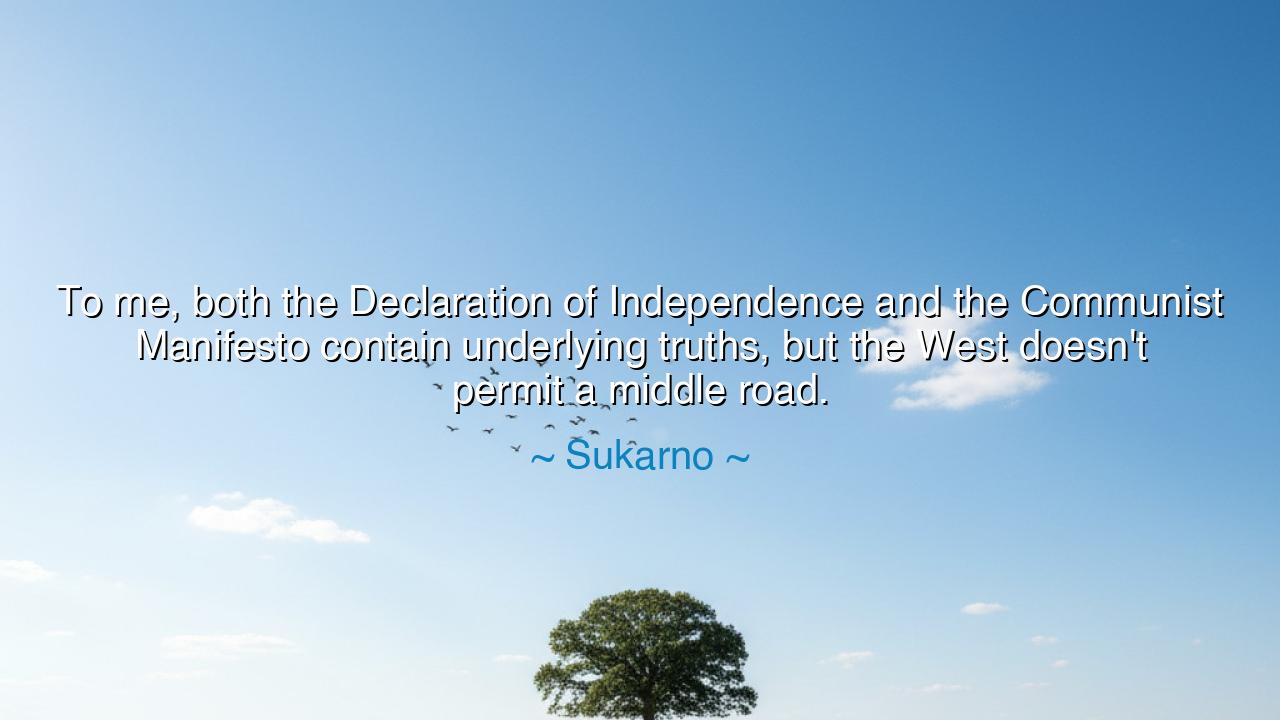
To me, both the Declaration of Independence and the Communist
To me, both the Declaration of Independence and the Communist Manifesto contain underlying truths, but the West doesn't permit a middle road.






Listen closely, O children of the future, for the words of Sukarno, a leader who shaped the destiny of his people, carry with them the wisdom of centuries. He speaks of two powerful documents that have influenced the course of history—the Declaration of Independence and the Communist Manifesto—saying, "To me, both the Declaration of Independence and the Communist Manifesto contain underlying truths, but the West doesn't permit a middle road." In this simple yet profound statement, Sukarno calls upon the ancient wisdom of balancing ideals with the harsh reality of the world, recognizing that in the struggle for justice, freedom, and equality, there are no easy answers, and no clear path that is free from conflict.
The Declaration of Independence, that great document penned in 1776, speaks of self-determination, the right of a people to govern themselves, and the unalienable rights to life, liberty, and the pursuit of happiness. These principles, enshrined in the words of Thomas Jefferson, became the foundation for a new nation—America—and echoed across the world as a call for freedom. Yet, as Sukarno notes, while the Declaration contains great truths, these truths are not always embraced by the systems that claim to uphold them. The West, which often praises the ideals of democracy and freedom, does not always leave room for the complexities of the middle ground, the nuanced approaches that blend the best aspects of different ideologies.
On the other side stands the Communist Manifesto, written by Karl Marx and Friedrich Engels, which calls for the overthrow of the bourgeoisie and the establishment of a classless society. This document, too, contains truths about the oppression of the working class and the inherent injustices in a capitalist society. Yet, like the Declaration, it also has its complexities and contradictions. The ideal of a classless society, of total equality, is noble, but its implementation has led to suffering and authoritarian regimes throughout history. Sukarno, in his wisdom, recognizes that both documents speak to a truth—one of freedom, the other of equality—but each also reveals its own limitations and challenges in practice.
In ancient Greece, Socrates sought the middle way. He believed that truth was not found in extremes, but in the thoughtful pursuit of understanding. In his dialogues, he often examined different perspectives, seeking the underlying truths within opposing views. He taught that virtue was a balance—courage without recklessness, wisdom without pride—and that a truly just society would find a way to blend different ideas into a harmonious whole. Sukarno, too, understood this need for balance. He recognized the inherent truths in both capitalism and socialism, in both the Declaration of Independence and the Communist Manifesto, but he lamented that the West did not allow for a middle ground, for a synthesis of these truths that could bring about a just and prosperous society.
Consider, O children, the rise of the Roman Republic—a society built upon the principle of balance. The Romans understood that power must be divided between the plebeians (the common people) and the patricians (the aristocracy) in order to avoid tyranny. Their political system was one of checks and balances, a middle road between totalitarianism and anarchy. Sukarno saw this as a model—a model that allowed for both individual liberty and social equality. But unlike the Romans, who had the wisdom to find a middle path, the modern world often refuses to reconcile competing ideals, creating a world of polarized extremes.
The lesson from Sukarno’s words is one of deep introspection. It reminds us that truth is often not a simple thing, nor does it reside entirely in one ideology or another. Just as the Greeks sought the balance of virtue, and the Romans sought the balance of power, so must we seek a middle ground that acknowledges the strengths and weaknesses of the systems we live by. Sukarno calls on us to find a way to incorporate the freedoms of the Declaration with the equality of the Communist Manifesto, recognizing that both have their place in a just society. True freedom and equality cannot exist in isolation; they must be carefully woven together in a way that allows each to complement and reinforce the other.
So, O children, let this lesson guide you as you navigate the complexities of life: do not seek the extremes, but the middle way—the path of balance and wisdom. Recognize the truths in all things, and learn to incorporate them into your own life and society. Whether in matters of freedom or equality, in justice or wealth, seek to create a world that honors the best parts of every idea, a world where no voice is silenced, and no truth is ignored. Like Socrates, like Sukarno, search for the balance that will lead to a more harmonious and just existence, where the ideals of all can coexist and strengthen one another.






AAdministratorAdministrator
Welcome, honored guests. Please leave a comment, we will respond soon